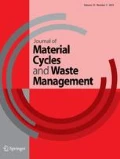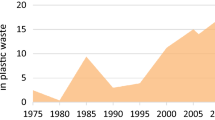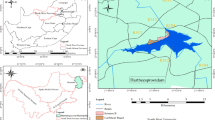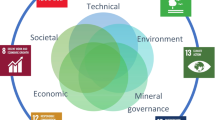Abstract
Massive urbanization and rapid development of urban economy have increased the generation of municipal solid waste in China. Like all developing countries, the Chinese government has endeavored to enact some policies for municipal solid waste with a goal to reduce its negative impacts on the natural environment and public health. Here, the purpose of this paper is to retrospectively examine the policy-making coordination of municipal solid waste policies (MSWPs). This was done through proposing an analytical framework, which was made up of policy level, policy subject, and policy tools. To achieve this, 421 MSWPs were gathered from January 1, 1981 to March 1, 2015. It was found that the coordination of policy levels is strong after 2000. However, the coordination between policy subjects is weak. The main reason is that “fragmented authoritarianism” produces inter-ministerial competition which creates power struggles obstructing proper coordination among policy subjects. The coordination of policy tools is strong.










Similar content being viewed by others
References
Zheng LJ, Song JC, Li CY, Gao YG, Geng PL, Qu BN, Lin LY (2014) Preferential policies promote municipal solid waste (MSW) to energy in China: current status and prospects. Renew Sustain Energy Rev 36:135–148
Chen XD, Geng Y, Fujita T (2010) An overview of municipal solid waste management in China. Waste Manag 30:716–724
Li JH, Tian BG, Liu TZ, Liu H, Wen XF, Honda S (2006) Status quo of e-waste management in mainland China. J Mater Cycles Waste Manag 8:13–20
Yao RM, Li BZ, Steemers K (2005) Energy policy and standard for built environment in China. Renew Energy 30:1973–1988
Ni K, Lu YL, Wang TY, Shi YJ, Kannan K, Xu L, Li QS, Liu SJ (2013) Polybrominated diphenyl ethers (PBDEs) in China: policies and recommendations for sound management of plastics from electronic wastes. J Environ Manag 115:114–123
Wan C, Shen GQ, Yu A (2014) The role of perceived effectiveness of policy measures in predicting recycling behaviour in Hong Kong. Resour Conserv Recycl 83:141–151
Su JP, Chiueh PT, Hung ML, Ma HW (2007) Analyzing policy impact potential for municipal solid waste management decision-making: a case study of Taiwan. Resour Conserv Recycl 51:418–434
Cui L, Chen LR, Li YP, Huang GH, Li W, Xie YL (2011) An interval-based regret-analysis method for identifying long-term municipal solid waste management policy under uncertainty. J Environ Manag 92:1484–1494
Hughes CE, Ritter A, Mabbitt N (2013) Drug policy coordination: identifying and assessing dimensions of coordination. Int J Drug Policy 24:244–250
Mcalister DT, Erffmeyer RC (2003) A content analysis of outcomes and responsibilities for consumer complaints to third-party organizations. J Bus Res 56:341–351
Billore S, Billore G, Yamaji K (2013) The online corporate branding of banks—a comparative content analysis of Indian and Japanese banks. J Am Bus Rev Camb 1(2):90–96
York QY, Zhang HQ (2010) The determinants of the 1999 and 2007 Chinese golden holiday system: a content analysis of official documentation. Tour Manag 31:881–890
Kathy KL, Julia A, Mita G, Damien C (2015) Conceptualizing the use of public involvement in health policy decision-making. Soc Sci Med 138:14–21
Peter PJ, Pieter G, Co V (2001) Interactive policy-making—a model of management for public works. Eur J Oper Res 128:322–337
Wang T, Xie NN (2013) Research on coordination of science technology and innovation policy based on content analysis method. Technol Econ 32:22–28
Zhang HM, Wang QW, Mortimer SR (2012) Waste cooking oil as an energy resource: review of Chinese policies. Renew Sustain Energy Rev 16:5225–5231
Barr S, Gilg AW (2005) Conceptualising and analysing household attitudes and actions to a growing environmental problem: development and application of a framework to guide local waste policy. Appl Geogr 25:226–247
Liu Y, Liu FY, Zhang JF, Gao JB (2015) Insights into the nature of food safety issues in Beijing through content analysis of an Internet database of food safety incidents in China. Food Control 51:206–211
Neuendorf AK (2002) The content analysis guidebook. Sage, London
Perreault WD, Leigh LE (1989) Reliability of nominal data based on qualitative judgments. J Mark Res 26:135–148
Lieberthal K (1992) Introduction: the ‘fragmented authoritarianism’ model and its limitations. In: Lieberthal K, Lampton D (eds) Bureaucracy, politics, and decision making in post-mao China. University of California Press, Berkeley
Su JP, Hung ML, Chao CW, Ma H (2010) Applying multi-criteria decision-making to improve the waste reduction policy in Taiwan. Waste Manag Res 28:20–28
Lai JS, Chang WY, Chan YC, Kang SC, Tan YC (2011) Development of a 3D virtual environment for improving public participation: case study—the Yuansantze Flood Diversion Works Project. Adv Eng Inform 25:208–223
Guerrero LA, Maas G, Hogland W (2013) Solid waste management challenges for cities in developing countries. Waste Manag 33:220–232
Acknowledgements
We thank the editors and the anonymous reviewers for their valuable comments and suggestions on our paper. This paper stems from a research project supported by the National Nature Science Foundation of China (NSFC) project (No. 71473056), National Soft Science Research Plans (No. 2013GXS4D113), National Social Science Fund (14BGL007), and Nature Science Foundation of Heilongjiang Province (No. G2015005).
Author information
Authors and Affiliations
Corresponding authors
Electronic supplementary material
Below is the link to the electronic supplementary material.
Rights and permissions
About this article
Cite this article
He, Z., Chu, Z., Zhao, M. et al. Policy-making coordination of municipal solid waste policies in China: a content analysis. J Mater Cycles Waste Manag 20, 1073–1084 (2018). https://doi.org/10.1007/s10163-017-0668-3
Received:
Accepted:
Published:
Issue Date:
DOI: https://doi.org/10.1007/s10163-017-0668-3




